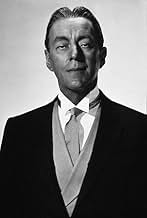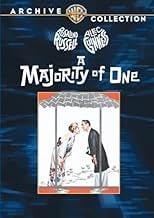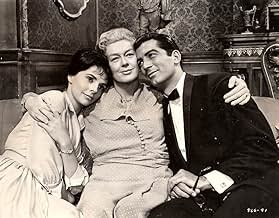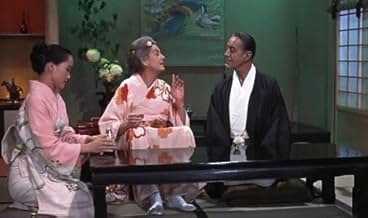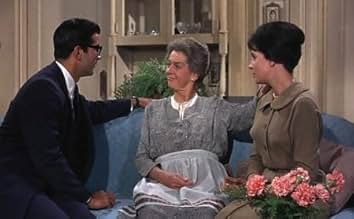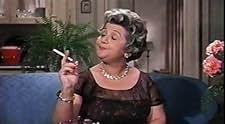IMDb RATING
6.7/10
1.3K
YOUR RATING
A gentle love story about a Japanese businessman and widower, and a Brooklyn widow. But before a happy ending can ensue, they must learn again the lessons of tolerance, kindness, and forgive... Read allA gentle love story about a Japanese businessman and widower, and a Brooklyn widow. But before a happy ending can ensue, they must learn again the lessons of tolerance, kindness, and forgiveness.A gentle love story about a Japanese businessman and widower, and a Brooklyn widow. But before a happy ending can ensue, they must learn again the lessons of tolerance, kindness, and forgiveness.
- Nominated for 1 Oscar
- 3 wins & 4 nominations total
Mae Questel
- Essie Rubin
- (as Mae Questal)
Harriet E. MacGibbon
- Lily Putnam
- (as Harriet MacGibbon)
Lillian Adams
- Mrs. Stein
- (uncredited)
Leon Alton
- Ship Passenger
- (uncredited)
Monya Andre
- Ship Passenger
- (uncredited)
Mary Chan
- Spectator at Disembarkation
- (uncredited)
Spencer Chan
- Ship Passenger
- (uncredited)
Featured reviews
Warner Bros. cast movie stars Rosalind Russell, and Alec Guiness in this movie based on the hit Broadway play directed by long time veteran Mervyn Le Roy with very fine Warner Bros production values.
Rosalind Russell an Irish Catholic Yankee was cast as a Brooklyn Jewish Matron, the part played by Gertrude Berg on Broadway. There is a lot of mileage between Roz Russell and Gertrude Berg! English star ( and also Catholic) Alec Guiness was assigned to play the Japanese male lead. Ms. Russell had a lot of talent and is one of the most glaring examples of a great actress who never won an Oscar. Alec Guiness right off his great Oscar win in The Bridge On The River Kwai playing the English officer tormented by his Japanese captors is elegant and intelligent in his performance in this film. Due to the deft professionalism and talent do these two very fine Stars pull off their characterization's.
Gary Vinson and Sharon Hugueny both WB stars are listed in the credits but I only saw them briefly. Warners contract star Ray Danton is fine in this film.
Rosalind Russell an Irish Catholic Yankee was cast as a Brooklyn Jewish Matron, the part played by Gertrude Berg on Broadway. There is a lot of mileage between Roz Russell and Gertrude Berg! English star ( and also Catholic) Alec Guiness was assigned to play the Japanese male lead. Ms. Russell had a lot of talent and is one of the most glaring examples of a great actress who never won an Oscar. Alec Guiness right off his great Oscar win in The Bridge On The River Kwai playing the English officer tormented by his Japanese captors is elegant and intelligent in his performance in this film. Due to the deft professionalism and talent do these two very fine Stars pull off their characterization's.
Gary Vinson and Sharon Hugueny both WB stars are listed in the credits but I only saw them briefly. Warners contract star Ray Danton is fine in this film.
This is a gentle little film that may have it's faults with the hindsight of 40 years, but is enjoyable, especially I feel to those that remember the post WW11 days.
Alec Guinness plays the part beautifully, with his usual master of the character, Rosalind Russel plays a good stereotyped Jewish Mother .... the other characters just fill in between the lines. The only character that I find fault with is 'Eddy' the No. 1 boy of the family in Tokyo. He is obnoxious and completely out of character with a real 'House Boy' of the times that was lucky enough to get a 'cushy number' working for an American Diplomat.
In these days of virtual reality with sex, blood and car chases being the three main criteria of movie making, this movie is like going to a stage production from the 50's...... gentle and enjoyable.
Alec Guinness plays the part beautifully, with his usual master of the character, Rosalind Russel plays a good stereotyped Jewish Mother .... the other characters just fill in between the lines. The only character that I find fault with is 'Eddy' the No. 1 boy of the family in Tokyo. He is obnoxious and completely out of character with a real 'House Boy' of the times that was lucky enough to get a 'cushy number' working for an American Diplomat.
In these days of virtual reality with sex, blood and car chases being the three main criteria of movie making, this movie is like going to a stage production from the 50's...... gentle and enjoyable.
Of course the producers needed some names to carry this, and after all, Guinness could play anything, right? Here we have Sir Alec in a variation on his standard Refined Exotic Man, very similar to his Prince Faisal in Lawrence of Arabia and Brahmin Professor Godbole from A Passage to India. On Broadway Mr. Asano was played by Cedric Hardwicke, so this was simply continuing established --and highly outdated-- practice.
At least the onstage Mrs. Jacoby was portrayed by Gertrude Berg, creator and star of TV's The Goldbergs (1949-1957), and the kind of little round Jewish mama one would visualize in the role. Roz does her best, but it's not just that she's doing Jew-Face to Guinness' Yellowface-- she comes across as gawky and vulgar rather than sweet and endearingly quaint.
As has been presented in innumerable interracial romances intended for white audiences, the potential shock is taken out by the knowledge that hey, after all, those actors are both white. Acting is pretending! Nowadays, however, audiences are more sophisticated and like a bit more realism.
Now, who would we cast in a new production of A Majority of One?
At least the onstage Mrs. Jacoby was portrayed by Gertrude Berg, creator and star of TV's The Goldbergs (1949-1957), and the kind of little round Jewish mama one would visualize in the role. Roz does her best, but it's not just that she's doing Jew-Face to Guinness' Yellowface-- she comes across as gawky and vulgar rather than sweet and endearingly quaint.
As has been presented in innumerable interracial romances intended for white audiences, the potential shock is taken out by the knowledge that hey, after all, those actors are both white. Acting is pretending! Nowadays, however, audiences are more sophisticated and like a bit more realism.
Now, who would we cast in a new production of A Majority of One?
What the world needs now and always is tolerance among people of different faiths. This sweet, charming film is a fine example of this principle. Rent it, buy it, see it. You won't be disappointed.
10mmallon4
I've never seen another love story like A Majority of One. A story of two elderly individuals who are worlds apart having to overcome their racial prejudice, as well as being one of the few films in existence about love at old age. These imperfect and flawed characters feel so real and human, and while two and a half hours may seem overlong, I believe this time is justified. I wish more films could have the level of honest storytelling on display here.
The casting as Alec Guinness as a Japanese businessman has been widely criticised but I have disagree, I thought he was perfectly convincing in the role. His character is flawed, he's not the stereotypical wise old Asian man who is full of otherworldly knowledge which he easily could have been; he makes mistakes and doesn't have the answers to everything. Unlike many Asian characters in Hollywood films, he doesn't talk in broken English or exhibit any other commonly seen Asian stereotypes. Compared to Japanese stereotypes seen in World War II propaganda films 20 years earlier, A Majority of One was certainly a sign of progress.
Why should an actor's race limit the roles they can portray? If they play a character of a different race convincingly and in a non- offence manner, I don't see any reason to be up in arms. Should the roles an actor may want to attempt be limited to only characters of their race? I feel there is a double standard at play here; for a non white actor to be cast in a role or as a character originally conceived as white it will be viewed as forward thinking and progressive; for a white actor to be cast in a non white role then it is considered racist? Film is a business and you need big stars for a movie to be box office hit; how many Asian actors where big stars to American audiences in the early 60's. A movie like A Majority of One was an initial stepping stone to more equal representation in film, perhaps it not succeed as the film was not a box office success but the intent was there.
Rosalind Russell plays a potentially unlikable bigoted character but she manages to make the role endearing with her lovable nature and witty comebacks. I didn't see her character as an exaggerated stereotype. I've seen far more exaggerated representations of Jews in other films (do I even need to list examples?). Her character has lead an ingrown life in Brooklyn, however the movie shows the younger generation of her daughter and son in law holding more progressive views and are less conservative than their elders. Russell won't enter a bedroom wither son in law inhabiting without permission in case he isn't decent; her daughter on the other hand will just walk on in. Likewise the film highlights westernised trends in Japan such as Alec Guinness wearing a western flat cap tot the popularity of American music and Hollywood movies in Japan, while still acknowledging the anti American sentiment which exists in Japan. Also this movie has Eddie, a whiny little brat but in a funny way; I love this guy.
The casting as Alec Guinness as a Japanese businessman has been widely criticised but I have disagree, I thought he was perfectly convincing in the role. His character is flawed, he's not the stereotypical wise old Asian man who is full of otherworldly knowledge which he easily could have been; he makes mistakes and doesn't have the answers to everything. Unlike many Asian characters in Hollywood films, he doesn't talk in broken English or exhibit any other commonly seen Asian stereotypes. Compared to Japanese stereotypes seen in World War II propaganda films 20 years earlier, A Majority of One was certainly a sign of progress.
Why should an actor's race limit the roles they can portray? If they play a character of a different race convincingly and in a non- offence manner, I don't see any reason to be up in arms. Should the roles an actor may want to attempt be limited to only characters of their race? I feel there is a double standard at play here; for a non white actor to be cast in a role or as a character originally conceived as white it will be viewed as forward thinking and progressive; for a white actor to be cast in a non white role then it is considered racist? Film is a business and you need big stars for a movie to be box office hit; how many Asian actors where big stars to American audiences in the early 60's. A movie like A Majority of One was an initial stepping stone to more equal representation in film, perhaps it not succeed as the film was not a box office success but the intent was there.
Rosalind Russell plays a potentially unlikable bigoted character but she manages to make the role endearing with her lovable nature and witty comebacks. I didn't see her character as an exaggerated stereotype. I've seen far more exaggerated representations of Jews in other films (do I even need to list examples?). Her character has lead an ingrown life in Brooklyn, however the movie shows the younger generation of her daughter and son in law holding more progressive views and are less conservative than their elders. Russell won't enter a bedroom wither son in law inhabiting without permission in case he isn't decent; her daughter on the other hand will just walk on in. Likewise the film highlights westernised trends in Japan such as Alec Guinness wearing a western flat cap tot the popularity of American music and Hollywood movies in Japan, while still acknowledging the anti American sentiment which exists in Japan. Also this movie has Eddie, a whiny little brat but in a funny way; I love this guy.
Did you know
- TriviaWhen Eddie is repairing Mrs. Jacoby's TV, rather than actually shooting the scene with material already selected and pre-recorded to be seen on the TV's screen, the filmmakers used another, less expensive trick; since TV scan rates are not the same as film, whenever a TV is seen (and it's showing something being broadcast), the dark scan lines are visible (and sometimes the TV's picture will "roll"). As this was still early in the TV-era, showing TVs broadcasting was something of a novelty, but it came with the aforementioned problems. To combat this, a "TV" was built (or, more accurately, something which looked like a TV). What's being shown on the "screen"' is actually film, which is being projected from behind the scene, and with the aid of a mirror, and a semi-translucent material to give the illusion of a screen, the result is that a high-quality image is seen, and there's no problem synching camera with TV.
- GoofsThe steering wheel of the taxi cab is on the wrong side.
- ConnectionsReferenced in The Human Jungle: Struggle for a Mind (1964)
- SoundtracksWhere Am I? (Am I in Heaven?)
(uncredited)
Music by Harry Warren
Played when Mrs. Jacoby and Mr. Asano discuss the dateline and Russia on board the ship
Details
- Release date
- Country of origin
- Languages
- Also known as
- 1000 Meilen bis Yokohama
- Filming locations
- Production company
- See more company credits at IMDbPro
- Runtime2 hours 36 minutes
- Aspect ratio
- 1.85 : 1
Contribute to this page
Suggest an edit or add missing content



